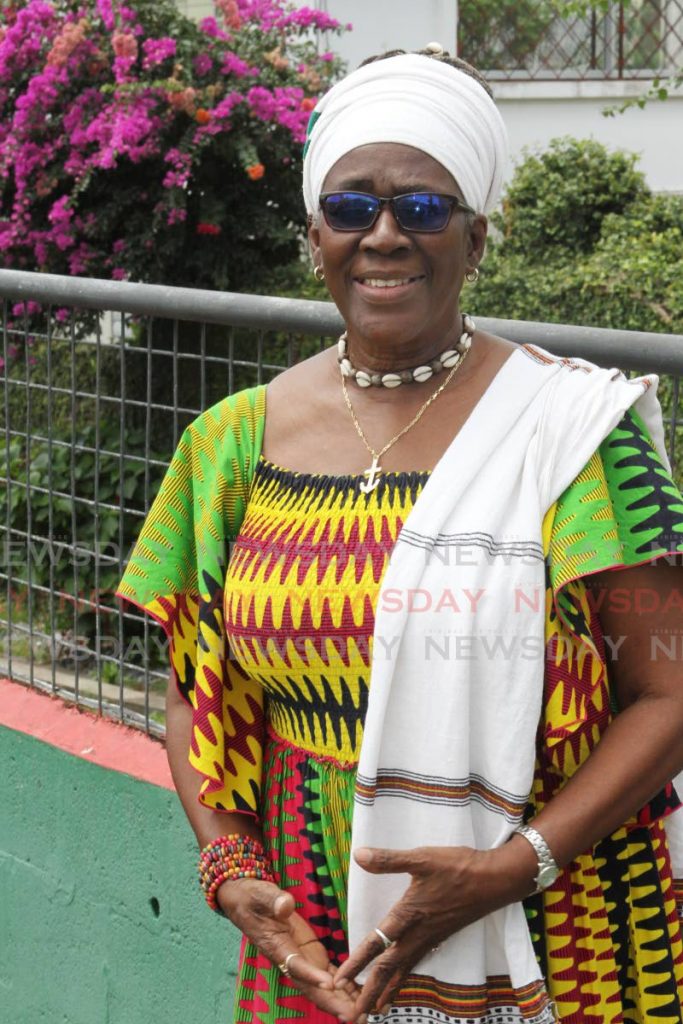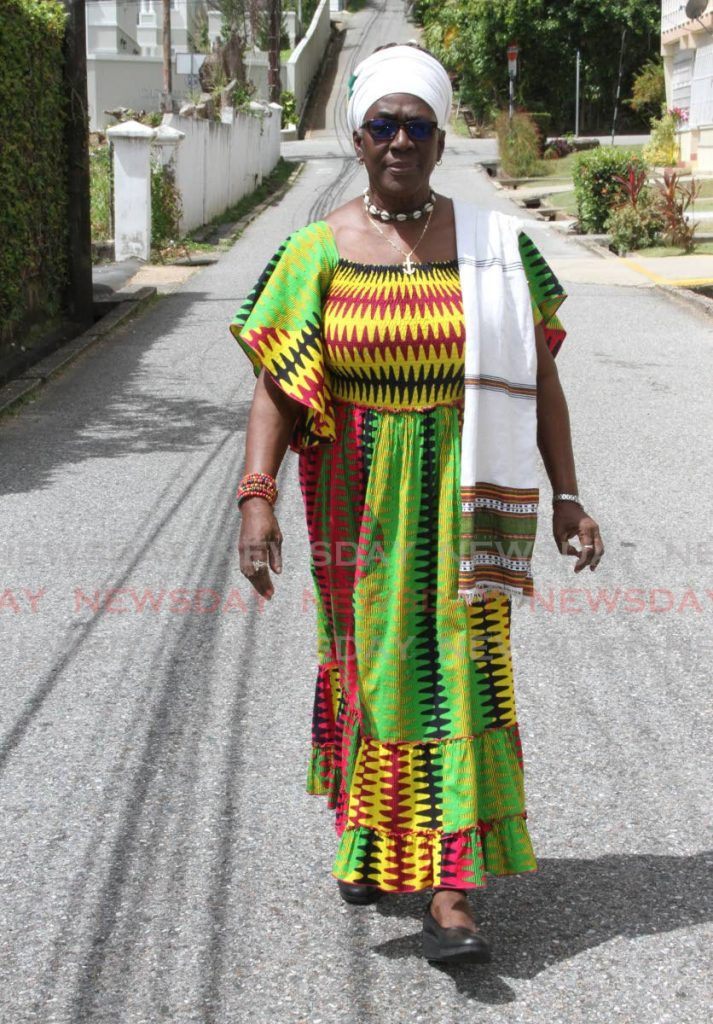Zakiya's mission as first woman to lead Emancipation Support Committee

Zakiya Naila Uzoma-Wadada is a strong African name which translates to "one who succeeds the right way," and executive director of the Emancipation Support Committee could not have chosen a more apt name for herself.
Zakiya Naila are Swahili names, while Uzoma-Wadada originated from West Africa.
Uzoma-Wadada changed her name by deed poll in 1979, when she began to understand the importance of the meaning and energy of a name, and the significance to the identification of one’s ethnicity.
Set to take over from Khafra Kambon as the first female executive chairman of the organisation when he retires on February 26, Uzoma-Wadada, 64, is determined to teach Afro-Trinidadians about their history and how to deal with issues that still affect them.
Born Wendy Manners to parents Clyde Manners and Agnes Williams-Manners in Laventille, she attended Belmont Girls' RC Primary School. She moved to the Gonzales community to live with a cousin where she wrote the Common Entrance exam (known today as Secondary Entrance Assessment) and passed for St Joseph's Convent, Port of Spain.
After completing her GCE ordinary and advanced level examinations, she followed her dream of becoming a teacher and was appointed to her former primary school for a while, and then St Rose’s Girls’ Intermediate School. She then attended the teachers' training college, where she qualified as a trained teacher.
After teaching for a few years, Uzoma-Wadada stopped and went into business, opening a health food store.
"At that time, people were now becoming conscious about eating healthy. I got married when I was 19 years and had my first son four months after my 20th birthday. That marriage lasted about four years. My second marriage was to someone from Antigua and we decided to go into business because he was into food, so we opened a health food store on Henry Street where we not only sold food, also herbs people could use for different ailments or make tea."
Uzoma-Wadada is now the proud mother of five children, and grandmother of six girls.
While at the teachers' college, Uzoma-Wadada was introduced to the leader of the National Joint Action Committee (NJAC) Makandal Daaga by his wife Liseli Daaga.
"She was also in college at the same time as me. I eventually became part of the NJAC for a little while. I actually went up for local government election, but I didn't particularly like the politics, but I continued to work for the party until I migrated to Antigua where I lived for about four years.
"I returned to TT after about four years later. I was a fabric designer at the time. Then I had five children, so I used fabric design to take care of my family for a while because my husband and I separated."
She did tie-dye work for designer Heather Jones and fabric stores such as Jimmy Aboud and Queensway.
She then worked as a principal at an African private school, Abiadama, a Yoruba Spiritual Baptist School opened by Pat McLeod (Shango Yumi), who was guided by the Orisha tradition.

Uzoma-Wadada said while the teachings at the school tried to instil some of the values of the African traditions and culture, it was not strictly for African children.
"It was an open school for anyone." The school closed since in early 2000.
Uzoma-Wadada also worked as programme director of the Caribbean Network for Rural Development. She has a master's of arts degree in agriculture and rural development and is also chairman of the Caribbean Natural Resources Institute (Canari).
Uzoma-Wadada began to work for the committee in 2005 as an executive director.
It was the Black Power Movement that influenced her to change her name.
"I was very strongly impacted by the Black Power Revolution even though I was at convent at the time, so, therefore, the opportunity to join or even be part of the revolution was very limited because you couldn't be seen taking part, and of course my mother was very strict. But, I read everything that was in the newspapers about the revolution and I was really, really interested as a young black person in TT. I had experiences about the issues that had been raised by the revolution and, therefore, I was really moved by the phrases 'black is beautiful' and 'say it loud, we're black and proud'.
"It gave the feeling that being black was not being less because I think at that time there was that sense in society. At the time, Africans were given the slave master's European name and their original African names were lost. I felt nobody would have ever known that I was an African no matter what I did. Our legacy would have been our African name. When I looked it up, Wendy means flighty and I wanted a name to be more reflective of who I am. I chose Zakiya because when I was small many people commented on how intelligent I was. Zakiya means intelligent, Naila means one who succeeds, and Uzoma means the right way because I always thought that whatever we do, we must do it the right way. My second husband's surname was Wadada which means love."
Uzoma-Wadada said her experience (with the committee) has been an extremely fulfilling one. She said she had a love for teaching since she was a child and the committee offered her the opportunity.
"I work with a lot of young people, do a lot of mentoring and coaching. All the work we do with community groups also gives me that opportunity. The ideas of the organisation I totally identify with, which is raising the consciousness of the African population, to help them have a better understanding of who we are, our own history and therefore a better sense of self.
"The organisation helps me to play those roles and use the skills that I have to apply them. It is very difficult and challenging work because we work with limited resources. But, that is what makes it such an accomplishment because we have to overcome so many hurdles. We have to become very creative."
Uzoma-Wadada said she has always admired Kambon for many years, for his approach to the struggle, his selfless commitment, his "do-or-die, never give up, we are going to be here no matter what kind of spirit and attitude."
"The board commits totally to the work of the organisation. When I joined the organisation, it was at the point where it was now beginning to try and develop itself to a fully-fledged development organisation. I had to bring all my skills to the organisation in the capacity of executive director to get it to that level. It is a work in progress and it is continuing to grow."
She admitted that there would be some changes, over time, when she takes over as chairman.
"This is something I have given a lot of thought to and then, of course, I am female. The organisation, since 1992, has been led by Khafra, who has made his mark on the organisation. Now I, as a female, who will be executive chairman will have to play a new role. Khafra will still play a role in the area of our international relations and human rights programme.
"Yes, I would like to believe there are areas of the work that I may want to really want to approach differently, or maybe do some of the things we wanted to do and continue to work at to make sure things get done. The organisation is still going to be managed by the board and therefore we continue to be guided by the decisions of the board."
Uzoma-Wadada did say that one of her new plans will be pursuing new relationships and developing approaches as to how the organisation will work with partners to improve partnerships.
"One of my focus would be the development and strategic partnerships and how that continues to help the organisation to grow and maintain its sustainability. Those are the areas I am particularly focused on."

Comments
"Zakiya’s mission as first woman to lead Emancipation Support Committee"